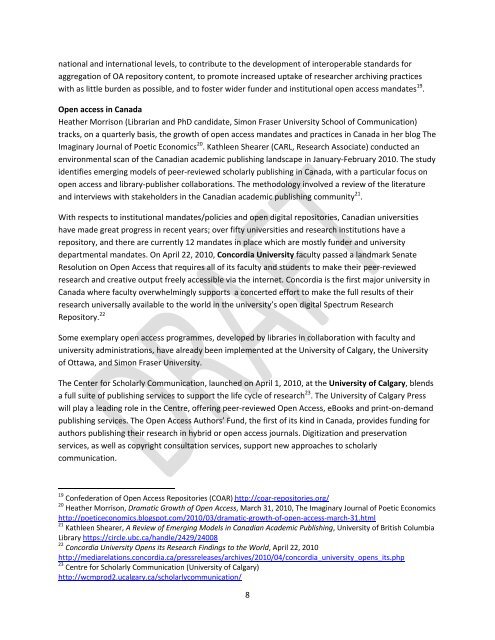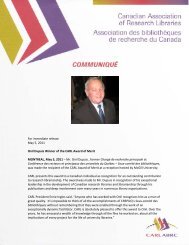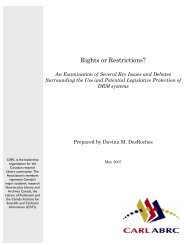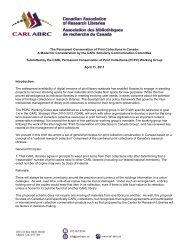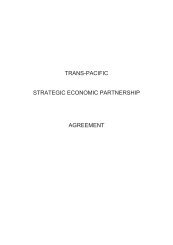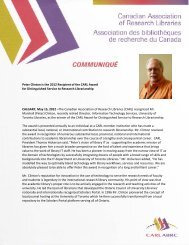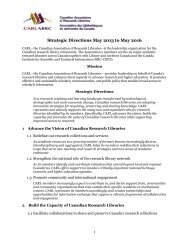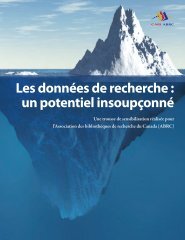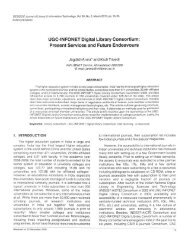PDF - CARL - ABRC
PDF - CARL - ABRC
PDF - CARL - ABRC
Create successful ePaper yourself
Turn your PDF publications into a flip-book with our unique Google optimized e-Paper software.
national and international levels, to contribute to the development of interoperable standards for<br />
aggregation of OA repository content, to promote increased uptake of researcher archiving practices<br />
with as little burden as possible, and to foster wider funder and institutional open access mandates 19 .<br />
Open access in Canada<br />
Heather Morrison (Librarian and PhD candidate, Simon Fraser University School of Communication)<br />
tracks, on a quarterly basis, the growth of open access mandates and practices in Canada in her blog The<br />
Imaginary Journal of Poetic Economics 20 . Kathleen Shearer (<strong>CARL</strong>, Research Associate) conducted an<br />
environmental scan of the Canadian academic publishing landscape in January‐February 2010. The study<br />
identifies emerging models of peer‐reviewed scholarly publishing in Canada, with a particular focus on<br />
open access and library‐publisher collaborations. The methodology involved a review of the literature<br />
and interviews with stakeholders in the Canadian academic publishing community 21 .<br />
With respects to institutional mandates/policies and open digital repositories, Canadian universities<br />
have made great progress in recent years; over fifty universities and research institutions have a<br />
repository, and there are currently 12 mandates in place which are mostly funder and university<br />
departmental mandates. On April 22, 2010, Concordia University faculty passed a landmark Senate<br />
Resolution on Open Access that requires all of its faculty and students to make their peer‐reviewed<br />
research and creative output freely accessible via the internet. Concordia is the first major university in<br />
Canada where faculty overwhelmingly supports a concerted effort to make the full results of their<br />
research universally available to the world in the university’s open digital Spectrum Research<br />
Repository. 22<br />
Some exemplary open access programmes, developed by libraries in collaboration with faculty and<br />
university administrations, have already been implemented at the University of Calgary, the University<br />
of Ottawa, and Simon Fraser University.<br />
The Center for Scholarly Communication, launched on April 1, 2010, at the University of Calgary, blends<br />
a full suite of publishing services to support the life cycle of research 23 . The University of Calgary Press<br />
will play a leading role in the Centre, offering peer‐reviewed Open Access, eBooks and print‐on‐demand<br />
publishing services. The Open Access Authors’ Fund, the first of its kind in Canada, provides funding for<br />
authors publishing their research in hybrid or open access journals. Digitization and preservation<br />
services, as well as copyright consultation services, support new approaches to scholarly<br />
communication.<br />
19<br />
Confederation of Open Access Repositories (COAR) http://coar‐repositories.org/<br />
20<br />
Heather Morrison, Dramatic Growth of Open Access, March 31, 2010, The Imaginary Journal of Poetic Economics<br />
http://poeticeconomics.blogspot.com/2010/03/dramatic‐growth‐of‐open‐access‐march‐31.html<br />
21<br />
Kathleen Shearer, A Review of Emerging Models in Canadian Academic Publishing, University of British Columbia<br />
Library https://circle.ubc.ca/handle/2429/24008<br />
22<br />
Concordia University Opens its Research Findings to the World, April 22, 2010<br />
http://mediarelations.concordia.ca/pressreleases/archives/2010/04/concordia_university_opens_its.php<br />
23<br />
Centre for Scholarly Communication (University of Calgary)<br />
http://wcmprod2.ucalgary.ca/scholarlycommunication/<br />
8


